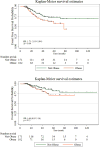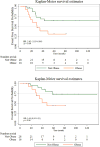Obesity and survival in the neoadjuvant breast cancer setting: role of tumor subtype in an ethnically diverse population
- PMID: 28948418
- PMCID: PMC5790631
- DOI: 10.1007/s10549-017-4507-y
Obesity and survival in the neoadjuvant breast cancer setting: role of tumor subtype in an ethnically diverse population
Abstract
Background: Obesity may negatively affect survival in breast cancer (BC), but studies are conflicting, and associations may vary by tumor subtypes and race/ethnicity groups.
Methods: In a retrospective review, we identified 273 women with invasive BC administered Adriamycin/Taxane-based neoadjuvant chemotherapy from 2004 to 2016 with body mass index (BMI) data at diagnosis. Obesity was defined as BMI ≥30. Associations between obesity and event-free survival (EFS), using STEEP events, and overall survival (OS), using all-cause mortality, were assessed overall and stratified by tumor subtype [[Hormone Receptor Positive (HR+)/HER2-, HER2+, and Triple-Negative Breast Cancer (TNBC])] in our diverse population.
Results: Median follow-up was 32.6 months (range 5.7-137.8 months). Overall, obesity was associated with worse EFS (HR 1.71, 95% CI 1.03-2.84, p = 0.04) and a trend towards worse OS (p = 0.13). In HR+/HER2- disease (n = 135), there was an interaction between obesity and hormonal therapy with respect to OS but not EFS. In those receiving tamoxifen (n = 33), obesity was associated with worse OS (HR 9.27, 95% CI 0.96-89.3, p = 0.05). In those receiving an aromatase inhibitor (n = 89), there was no association between obesity and OS. In TNBC (n = 44), obesity was associated with worse EFS (HR 2.62, 95% CI 1.03-6.66, p = 0.04) and a trend towards worse OS (p = 0.06). In HER2+ disease (n = 94), obesity was associated with a trend towards worse EFS (HR 3.37, 95% CI 0.97-11.72, p = 0.06) but not OS. Race/ethnicity was not associated with survival in any subtype, and there were no interactions with obesity on survival.
Conclusions: Obesity may negatively impact survival, with differences among tumor subtypes.
Keywords: Breast cancer; Neoadjuvant chemotherapy; Obesity; Race/ethnicity; Survival; Tumor subtype.
Conflict of interest statement
Figures



Comment in
-
Dose adjustment in obese breast cancer patients receiving neoadjuvant chemotherapy might have an impact on survival.Breast Cancer Res Treat. 2018 Feb;167(3):821. doi: 10.1007/s10549-017-4544-6. Epub 2017 Oct 23. Breast Cancer Res Treat. 2018. PMID: 29063310 No abstract available.
Similar articles
-
Obesity is an independent prognostic factor of decreased pathological complete response to neoadjuvant chemotherapy in breast cancer patients.Breast. 2017 Apr;32:237-244. doi: 10.1016/j.breast.2016.05.013. Epub 2016 Jun 16. Breast. 2017. PMID: 27318645
-
Long-term treatment efficacy in primary inflammatory breast cancer by hormonal receptor- and HER2-defined subtypes.Ann Oncol. 2014 Feb;25(2):384-91. doi: 10.1093/annonc/mdt525. Epub 2013 Dec 18. Ann Oncol. 2014. PMID: 24351399 Free PMC article.
-
Comparison of Pathologic Response Evaluation Systems after Anthracycline with/without Taxane-Based Neoadjuvant Chemotherapy among Different Subtypes of Breast Cancers.PLoS One. 2015 Sep 22;10(9):e0137885. doi: 10.1371/journal.pone.0137885. eCollection 2015. PLoS One. 2015. PMID: 26394326 Free PMC article.
-
Continental differences in the association between excess body weight and prognosis in triple-negative breast cancer: a meta-analysis.Breast Cancer Res Treat. 2025 Jan;209(2):215-227. doi: 10.1007/s10549-024-07538-w. Epub 2024 Oct 30. Breast Cancer Res Treat. 2025. PMID: 39476311 Review.
-
Neoadjuvant Therapy for HER2-positive Breast Cancer.Rev Recent Clin Trials. 2017;12(2):81-92. doi: 10.2174/1574887112666170202165049. Rev Recent Clin Trials. 2017. PMID: 28164759 Review.
Cited by
-
Better overall survival in patients who achieve pathological complete response after neoadjuvant chemotherapy for breast cancer in a Chilean public hospital.Ecancermedicalscience. 2021 Feb 11;15:1185. doi: 10.3332/ecancer.2021.1185. eCollection 2021. Ecancermedicalscience. 2021. PMID: 33777178 Free PMC article.
-
Current Landscape: The Mechanism and Therapeutic Impact of Obesity for Breast Cancer.Front Oncol. 2021 Jul 19;11:704893. doi: 10.3389/fonc.2021.704893. eCollection 2021. Front Oncol. 2021. PMID: 34350120 Free PMC article. Review.
-
Obesity is associated with early recurrence on breast cancer patients that achieved pathological complete response to neoadjuvant chemotherapy.Sci Rep. 2022 Dec 7;12(1):21145. doi: 10.1038/s41598-022-25043-2. Sci Rep. 2022. PMID: 36477462 Free PMC article.
-
The role of body composition in neurological and hematologic toxicity in a retrospective analysis of 120 breast cancer patients undergoing neoadjuvant chemotherapy: the COMBOTOX study.Breast Cancer Res Treat. 2025 Feb;210(1):205-213. doi: 10.1007/s10549-024-07553-x. Epub 2024 Dec 4. Breast Cancer Res Treat. 2025. PMID: 39630164 Free PMC article.
-
Obesity-Associated Breast Cancer: Analysis of Risk Factors and Current Clinical Evaluation.Adv Exp Med Biol. 2024;1460:767-819. doi: 10.1007/978-3-031-63657-8_26. Adv Exp Med Biol. 2024. PMID: 39287872 Review.
References
-
- Jiralerspong S, Goodwin PJ. Obesity and Breast Cancer Prognosis: Evidence, Challenges, and Opportunities. J Clin Oncol. 2016;34(35):4203–4216. - PubMed
Publication types
MeSH terms
Substances
Grants and funding
LinkOut - more resources
Full Text Sources
Other Literature Sources
Medical
Research Materials
Miscellaneous

